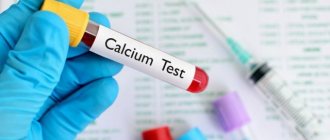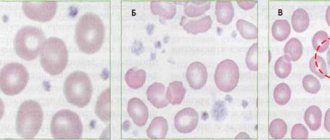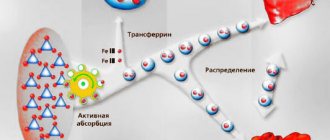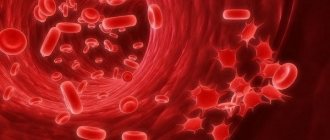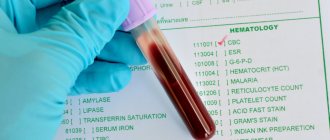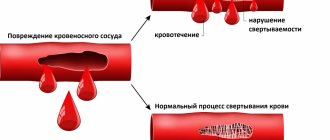Increased calcium in the blood - what could it be?
Theoretically, there are three most likely clinical problems that could cause elevated blood calcium levels. All possible reasons for calcium levels in the blood being higher than normal are quite serious.
The first cause of high blood calcium
is primary hyperparathyroidism, a disease accompanied by the appearance of a tumor in one or more parathyroid glands (it would be more correct to say “parathyroid glands,” but the term “parathyroid glands” is very widely used). The main task of the parathyroid glands in the body is to maintain normal blood calcium levels. The cells of the parathyroid glands “know how” to sense the concentration of calcium in the blood plasma and, in accordance with the level of calcium, produce parathyroid hormone. The main effect of parathyroid hormone is to increase the level of calcium in the blood (by destroying bone tissue and releasing calcium from it into the blood, as well as by enhancing the absorption of calcium from primary urine in the kidneys and enhancing its absorption from the intestines). When a tumor occurs in the parathyroid gland, its cells stop sensing the concentration of calcium in the blood - it “seems” to them that there is no calcium in the blood, or that it is low. Tumor cells begin to uncontrollably produce parathyroid hormone, which sharply increases the breakdown of bone tissue and the release of calcium from it into the blood. As a result, in the laboratory we determine increased blood calcium and at the same time high levels of parathyroid hormone. Most often, such changes are also accompanied by a decrease in the level of phosphorus in the blood and an increase in the level of calcium in the urine. The danger of the disease lies in a decrease in bone density with a tendency to fractures, bone deformation, and decreased growth. An increased level of calcium in the blood leads to the deposition of calcium salts in the walls of blood vessels and heart valves, which reduces their elasticity and increases the tendency to thrombosis, which means the risk of strokes and myocardial infarction.
The second possible cause of elevated calcium
– this is the breakdown of bone tissue due to the occurrence of metastases of a malignant tumor in it. Metastases have a so-called lytic effect, i.e. destroy bone tissue and release calcium salts from it, which enter the blood and lead to increased calcium levels in the blood. In this case, calcium in the blood is increased, but at the same time the level of parathyroid hormone is within the normal range or at the lower limit of normal.
The third possible cause of high calcium levels in the blood
– development of neuroendocrine tumors that produce so-called PTH-like peptides. These tumors are most often located in the lungs, although their location can be very variable. The size of such tumors is usually small - from 4-5 mm to 1-2 cm. They “know how” to produce chains of amino acids, the sequence of which coincides with the active end of parathyroid hormone. Such peptides (they are called PTH-like because they are very similar in action to parathyroid hormone) cause a situation where calcium in the blood is elevated, but laboratory analyzers do not show an increase in parathyroid hormone levels in this case, since PTH-like peptides do not completely copy the parathyroid hormone molecule.
Decrease values:
- DiGeorge syndrome, or a genetic disorder in which the parathyroid and thymus glands are underdeveloped or absent;
- dysfunction of the parathyroid glands due to its autoimmune lesion or surgical intervention;
- decreased magnesium levels;
- decreased vitamin D levels;
- liver and kidney damage, which reduces albumin levels;
- damage to pancreatic tissue or pancreatic necrosis;
- long-term use of certain medications;
- massive blood transfusion.
Blood test for calcium - which one is better?
There are two main types of calcium tests - an ionized calcium blood test and a total calcium blood test. Total calcium includes “free”, ionized calcium not bound to proteins + calcium bound to blood proteins (primarily albumin). The concentration of total blood calcium may change due to changes in protein content in the blood. At the same time, it is not total calcium that has a biological effect, but only that part of it that is not associated with proteins - this part is called ionized calcium. The ionized calcium blood test is more accurate than the total calcium test, but it is also more complex.
– not all laboratories are able to perform this analysis, and if they do perform it, not all do it accurately. There is an almost anecdotal situation when one of the largest laboratory networks in St. Petersburg “chronically”, for years, reveals low ionized blood calcium in almost all patients - and for years the laboratory does not want to correct this obvious laboratory error. But the consequence of such an error is tens of thousands of unnecessary additional studies performed on those patients who are “lucky” to receive such an incorrect analysis.
There are situations when ionized calcium is elevated, but total calcium is normal
– in this case, it is the analysis for ionized calcium that should be “trusted” more. At the same time, in most cases, increased blood calcium is manifested in both analyzes at once - increased ionized calcium and at the same time increased total calcium.
Considering the importance of ensuring maximum accuracy of a blood test for calcium and the high “price” of its incorrect determination, the North-Western Endocrinology Center conducts a blood test for calcium using equipment from the Russian representative office of the German laboratory network LADR. To carry out calcium analysis, an automatic biochemical analyzer Olympus AU-680 (Japan) is used, which provides maximum accuracy of the study and is capable of performing up to 680 tests per hour. Daily checks of the analyzer, the consistently high quality of its work and compliance by all center employees with standards for taking blood for calcium allow doctors of the North-Western Endocrinology Center to be confident in the quality of the blood test for calcium performed by the center’s laboratory. If in the blood test performed by our center the calcium is high, it means that the calcium is really elevated
.
| Automatic biochemical analyzer Olympus AU-680 (Japan) in the laboratory of the Endocrinology Center | Olympus AU-680 analyzer - computer station for processing and transmitting results |
Interpretation of results.
Calcium levels are assessed over time by a doctor in combination with other laboratory parameters and clinical data. Independent, isolated assessment leads to incorrect conclusions.
All laboratory services
Make an appointment through the application or by calling +7 +7 We work every day:
- Monday—Friday: 8.00—20.00
- Saturday: 8.00–18.00
- Sunday is a day off
The nearest metro and MCC stations to the clinic:
- Highway of Enthusiasts or Perovo
- Partisan
- Enthusiast Highway
Driving directions
If blood calcium is elevated, what should you do?
As we noted earlier, increased calcium is always a reason for additional examination and consultation with an endocrinologist. In order to come to an appointment with an endocrinologist “not empty-handed,” it is better to take some additional tests before meeting the doctor.
The standard examination of patients with elevated blood calcium includes the following blood tests:
- parathyroid hormone;
- calcitonin;
- phosphorus.
This is the minimum with which you can already come to a consultation with a doctor. It is clear that the doctor can then order additional tests, but the three blood tests listed above will help him figure out in which direction he should conduct a diagnostic search.
When consulting patients with endocrinologists at the North-Western Endocrinology Center, we almost insist on performing blood tests in the laboratory of our center
- this is the only way we can be sure that there are no laboratory errors and that our reasoning about the possible causes of elevated calcium levels in the blood is correct. The ion composition of the blood in the laboratory of our center is studied using the Olympus AU-680 analyzer (Japan) already mentioned above, and the blood test for such important indicators as parathyroid hormone and calcitonin is performed by an automatic chemiluminescent immunoassay analyzer of the 3rd generation DiaSorin Liaison XL (Italy) - some of the best machines in the world for analyzing blood for hormones and tumor markers.
| Automatic immunochemiluminescent analyzer 3rd generation DiaSorin Liaison XL (Italy) | The 3rd generation chemiluminescent immunoassay analyzer allows you to identify situations where high calcium is combined with high parathyroid hormone |
Endocrinologists and endocrinologist surgeons at the North-Western Endocrinology Center independently perform
Ultrasound of the thyroid gland and neck is important for searching for possible tumors of the parathyroid glands, which we simply have to suspect in the patient if there is an elevated level of calcium in the blood.
The second important instrumental study that needs to be done in patients with elevated blood calcium levels is determination of bone density, densitometry
. Calcium in the blood does not increase on its own - it is “taken” from bone tissue, which releases calcium into the blood and, as a result, reduces its density, which can lead to fractures. Densitometry, as well as ultrasound of the thyroid gland, is performed independently by endocrinologists at the North-Western Endocrinology Center. This is also an important argument in favor of examination and treatment in a specialized center.
The third important argument to contact a specialized center in any case if your blood calcium is elevated is the opportunity to undergo any medical procedures within the walls of the same institution
. Even during the examination, not only will you have high blood calcium, but it will also become clear that parathyroid hormone is elevated, and a parathyroid adenoma will be detected in your neck - its removal can also be effectively performed at the North-Western Endocrinology Center. At the moment, our center is the undisputed leader in the treatment of patients with high blood calcium in Russia - every year the center's endocrinologist surgeons remove parathyroid adenomas from more than 300 patients. In terms of the number of operations on the parathyroid glands, our center is now in third place in Europe.
Indications for the study
Blood test for calcium
is prescribed in the following cases:
- planned preventive examination;
- kidney pathologies (in patients with such diseases, the level of macronutrients is often reduced);
- suspicion of excess Ca (in the presence of symptoms such as nausea, loss of appetite, weakness, excessive thirst);
- frequent muscle cramps;
- diseases that are associated with calcium metabolism disorders (oncology, thyroid pathologies, etc.);
- some abnormalities detected on the cardiogram;
- symptoms of macronutrient deficiency (hand tremors, muscle cramps, spastic abdominal pain);
- treatment of calcium metabolism disorders.
Blood calcium is elevated, other tests have been taken - how to decipher them?
Of course, deciphering a blood test is the prerogative of the attending endocrinologist, and independent study of one’s blood test can lead the patient to diagnostic errors, however, within the framework of this article, we will give some information about the possible results of a laboratory examination for elevated blood calcium. Use the information obtained with caution and remember that it is not a substitute for consultation with a medical specialist.
So, possible options for laboratory results and their interpretation.
Blood calcium is increased, parathyroid hormone is increased, phosphorus is decreased, calcitonin is normal, calcium in daily urine is increased
– most likely, we are talking about primary hyperparathyroidism and the presence of a parathyroid adenoma. Additional examination is necessary using ultrasound of the thyroid gland and neck, scintigraphy of the parathyroid glands with technetril, and in some cases, computed tomography of the neck. It is treated surgically (endoscopic surgery through an incision about 2 cm long is possible in a specialized center).
Parathyroid hormone is elevated, calcium is normal, phosphorus is normal, calcitonin is normal
– with a high degree of probability we are talking about secondary hyperparathyroidism due to a banal deficiency of vitamin D in the blood. It is treated by taking vitamin D and calcium. It is important to exclude a laboratory error associated with an underestimation of the level of ionized calcium in the blood (it is better to retake the test for ionized calcium in a specialized laboratory of the endocrinology center).
Calcium in the blood is increased, parathyroid hormone is normal, phosphorus is normal, calcitonin is normal
– a neuroendocrine tumor that produces PTH-like peptides or forms lytic metastases in the bone should be suspected. Examination and treatment depend on the type of tumor detected.
High calcium in the blood (usually slightly increased calcium is observed), parathyroid hormone is moderately increased, phosphorus is normal, calcitonin is normal, calcium concentration in daily urine is reduced
– we can talk about a rare familial disease, the so-called familial benign hypocalciuric hypercalcemia. This disease is accompanied by a change in the sensitivity of cellular receptors to parathyroid hormone and impaired calcium excretion in the urine. Does not require treatment and is not dangerous. Often, inexperienced doctors diagnose primary hyperparathyroidism in such cases and refer the patient to unnecessary surgery to remove a non-existent parathyroid adenoma.
Ionized calcium is increased, total calcium is normal, parathyroid hormone is increased
– we are usually talking about parathyroid adenoma.
Ionized calcium is elevated, total calcium is below normal
– laboratory error must be excluded. The analysis should be re-taken in a specialized laboratory.
Ionized calcium in the blood is increased, parathyroid hormone is increased, calcitonin is increased
– the patient should be suspected of having both a parathyroid adenoma and medullary thyroid cancer. Together, these two diseases indicate a high probability that the patient has type IIA multiple endocrine neoplasia syndrome - a rare hereditary pathology transmitted in the family and leading to the development of three dangerous tumors: medullary thyroid cancer, parathyroid adenomas (usually multiple), pheochromocytoma (tumor adrenal gland, which produces adrenaline or norepinephrine). Urgent consultation with an endocrinologist or endocrinologist surgeon is required!
Calcium in the blood is elevated during the first test, I want to retake the test - what is the best way to do this?
If you want to check whether your blood calcium is really elevated and are going to take a second blood test, follow some important rules that will help the second test be as accurate as possible:
1. a blood test should be taken only in a specialized laboratory using high-quality equipment;
2. a blood test must be taken only on an empty stomach;
3. if you are taking vitamin D or calcium supplements (or combination medications with vitamin D and calcium), stop them at least 2-3 days before your blood test; the entry of calcium from the drug into the blood can lead to an increased calcium level in the blood - of course, in this case a falsely elevated calcium is detected.
Factors causing low performance
Hypocalcemia (Ca deficiency) develops against the background of:
- Vitamin D deficiency in the body.
- The patient's serious condition resulting from a burn.
- Postoperative period.
- Metabolic changes caused by alkalosis.
- Magnesium deficiency.
- Signs of rickets.
- Pancreatic dysfunction.
- Pathologies of the kidneys and liver.
- Disturbances in the process of calcium absorption.
It should be noted that reduced levels of the ionized blood component are especially dangerous for the developing child’s body and the elderly.
Characteristic signs of low calcium
If Ca in the blood is significantly reduced, the following symptoms are observed:
- Osteoporosis develops.
- Teeth are destroyed.
- There is increased brittleness of nails.
- Dry skin, brittleness and dullness of hair are observed.
- Arrhythmia and tachycardia develop.
- Blood clotting decreases.
- There is increased nervousness, mood instability, accompanied by intense headache and dizziness.
Destructive processes occurring against the background of calcium deficiency threaten serious complications that negatively affect the functioning of vital structures of the body.
Traditional methods
Herbal medicine is used after consultation with the attending physician, as an addition to the main treatment.
Hypocalcemia
Freshly washed leaves and young shoots of nettle are passed through a juicer. After which pure nettle juice is diluted with cold boiled water in a ratio of 1:3, the mixture is boiled for 3 minutes. Take 3 teaspoons/day for 3 doses (3 months).
St. John's wort herb (1 tablespoon) is poured with boiling water (1 glass) and kept in a water bath (15 minutes). Leave for 1 hour. Add 100 grams of honey and 1 tablespoon of lemon juice to the infusion. Drink the infusion 3 tablespoons/day for 3 doses (2 months).
Honey and butter in a 2:1 ratio are mixed and melted in a water bath, lemon juice is added to the cooled mixture. Drink 3 tablespoons/day for 3 doses.
Hypercalcemia
Herbal medicine is unlikely to be able to reduce the concentration of ionized calcium in the blood, but it is quite effective against calcifications on the walls of blood vessels.
1 tablespoon of crushed artichoke leaves is poured into 1 glass of boiling water and left to infuse. After the cooled infusion is drunk. Drink artichoke infusion once a day for 1 month.
10 grams of steelweed, dandelion, and burdock roots are poured with vodka (300 ml). They insist for 1 month. Drink 10 drops/day for 2 doses.

